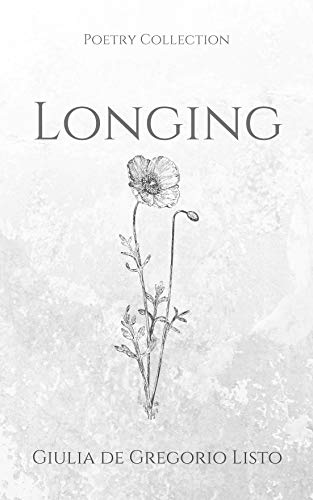Published August 31st, 2020
Review
by Ferdoss Shaarani

Longing is a poetry collection written by Brazilian poet Giulia de Gregorio Listo in 2019. She has been featured in The Junction, Literati Magazine, Literally Literary, The Ibis Head Review, and others.
De Gregorio Listo begins her introduction to Longing with “There is always something missing…” Through her poetry, she suspends her readers in a world dominated by scavenged dictionary-invocations, feelings and wounds, dark paths, and lighthouses. However, to de Gregorio Listo, there is always that longing for something more — something that is achieved only by change or transformation. Moreover, the poetry in de Gregorio Listo’s Longing clearly reflects her search for that “something”. She reshapes, relearns, and transforms reality through her words in an attempt to make sense of this longing.
Giulia de Gregorio Listo provides several names for longing in her poetry collection; “Deprivation” is one of those names. In this poem, de Gregorio Listo describes the uncertainty and loneliness that come with living in “waiting hours.” Throughout the poem, she proves that the wait is, in fact, not only in hours but in “nights like this,” “three weeks,” and “another time” even. De Gregorio Listo expresses anguish because of always having to go towards unreachable places and wait for someone or something that never really shows up.
In “Deprivation,” there is also a sense of helplessness or insufficiency throughout the fifth stanza. De Gregorio Listo writes, “Every person could be you if…”, “Every movie character could be us…”, and “Every song could be telling our story.” Clearly, de Gregorio Listo presents a sense of lingering disappointment through her use of “could.” She describes a helpless disappointment at the fact that she will never be able to pursue an “otherworldly” kind of love, and that she is only limited to what is ordinary. Moreover, the possibility of the fulfilment of these otherworldly dreams is somewhat shattered — de Gregorio Listo calls them “bleached” dreams.

Eventually, de Gregorio Listo comes to terms with this helplessness; even though she wants to believe in something else, she has “never been sure” what this something is. She cannot be sure that longing is pure, ethereal, and as truthful as a poem. Instead, she chooses to believe that another name for this longing is “loneliness”; in pondering on longing, she is fueled by her feelings of loneliness and helplessness.
Another name that de Gregorio Listo gives for longing is “Invitation.” In this poem, she tackles longing in a more hopeful rather than helpless tone. De Gregorio Listo expresses the wonders of “just being” and “just fully existing” rather than the worries and anxieties that come with this existence. De Gregorio Listo communicates that simple actions are sometimes considered enough to create a “whole melody.”
The loneliness in “Deprivation” is countered by this sense of hopefulness in “Invitation.” It is an invitation to closeness, to intimacy, and to unity. De Gregorio Listo invites the reader to exist around her, under her, and over her. She suspends the reader in a world of sweetness, in which flowers, stones, old blankets, and typewriter-notes are infinitely important. She invites the reader into this welcoming world where the half-asleep, half-angry would still open doors and offer warmth to whoever asks for it.
Additionally, de Gregorio Listo acknowledges that the image she has created is not perfect. She compares this world of warmth to “split glass,” “a malfunctioning shower,” and “rain that never bails on wetting the floor.” Though she is aware of these imperfections, she nevertheless still believes in a “dome,” “harbour,” or safe space in which one can embrace unity, hopefulness, and the wholeness achieved through simply being or existing.
The poetry collection by Giulia de Gregorio Listo expresses what it means to reflect inwardly upon oneself, and tug at the absences that consume us completely. In this poetry collection, de Gregorio Listo gives several names for longing; describing what is ambivalent, and giving a name to what is unnamable. I have only mentioned two of her poems in this review, but the entire collection manages to be both absolutely heart-wrenching and heartwarming. Longing itself gives a new meaning to “longing” as a concept, and creates a surprising and novel experience for all readers of this book.
Nationality: Lebanese
First Language(s): Arabic
Second Language(s):
English
Supported by:


Comments on "The Countless Names for Longing — A Review of "Longing" by Giulia de Gregorio Listo"
Please log in to submit a comment.
Login